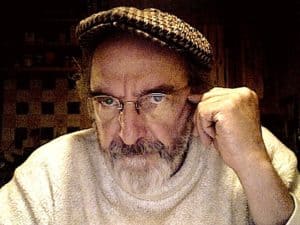I’m not an academic with deep knowledge of Shakespeare let alone 16th/17th century English theater. But I love the Canon and good literature and words and feelings…and writing….

Reflecting about what it means to write—about the very process—I imagine the man who wrote the Canon yclept Shakespeare as having a miraculous mind: disciplined, dedicated, grandly grasping at what human nature is capable of. At any rate, this is what the author of the Canon is telling me. (He may be telling you other things). I have acted in and directed Shakespeare. And soon I worshipped the author. I went on to read Harold Bloom’s tome (Shakespeare: The Invention of the Human) …twice. I didn’t know there were any serious questions about the authorship of the plays. So, when I heard that the man from Stratford might not be the true author, I fell immediately to pondering: “Did the real author know that he wouldn’t get credit for his work?”
In April, 2006 two friends of mine, Michael A’Dair and William J. Ray, invited me to a series of lectures that they would jointly give with the purported purpose of declaring to the world—or rather to our tiny town of Willits, north of San Francisco, that Shak-spere wasn’t Shakespeare—well, I had to go in order to laugh (affectionately) at their imaginative theory.
Bill’s invitation had been stentorian: “Come, Lancelot, join us and learn how Shakespeare was in fact Edward De Vere, 17th Earl of Oxford, who employed the businessman-impresario Gulielmus Shakspere to deflect official attention from the politically subversive and socially déclassé activity of a 16th century aristocrat presenting plays for the masses…”
Why not go and watch local talents present this theory to maybe a handful of our friends and neighbors? But there were 30 or 40 people there, some from the neighboring county-seat, tracking Ray and A’Dair’s every step of the way.
At the end of their talks and the Q & A, half the audience stood up to applaud while the other half shuddered to consider the implications. One local Shakespearean aficionado, who taught our young people to appreciate the Swan of Avon, also stood up, but only to froth and foment at the sacrilegious overreach, his fist threatening as he stormed out.
My two good friends, however, impressed me with their scholarship, sincerity, and pluck.
Before, I knew little of the Stratford man who had somehow written the Canon. Now, I saw how the tortured soul of a man ripped from his mother, his father’s identity unknown but aristocratic, and…along the way, authored the Canon.
I tried to imagine it, feel it, weigh it against other parts of myself, as a writer. The rush of completing a fabulous speech…or a whole play or long poem…and knowing that someone else was to enjoy the laurels. Of knowing it was you. Your experiences. Who saw it, felt it, and copied it to parchment. it. The frustration. The anger. The quintessential sadness…
— Lanny Cotler
“How I Became an Oxfordian” is edited by Bob Meyers. You may submit your essay on this topic (500 words or less in an editable format such as MS Word), along with a digital photo of yourself, to: communications@shakespeareoxfordfellowship.org. Also include a sentence about yourself (e.g., “John J. Smith is a businessman in San Francisco.”)
SOF memberships are now available on our membership page. Join or renew now!


